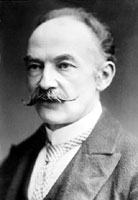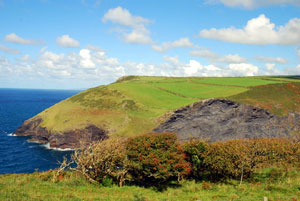|
Baseball has had only one player utterly superlative in two disparate aspects of the game; Babe Ruth already had his Cooperstown ticket punched for
his ability to throw the ball when he decided to start hitting it like no one had ever seen. He was a freak, two Hall of Famers in one, “Beethoven and Cézanne,” as Daniel Okrent poetically described him.
With five centuries on the old ballgame, English literature has managed a couple of two-genre genii. The first, William Shakespeare, runs away with
the title “the Babe Ruth of English letters”–no one comes close. If he’d only given us his sonnets, he’d still rank high atop the list of immortal
bards, but he wrote some plays as well….
After scouting all the prospects and poring over the roster, I come up with only one other writer in English who attained true greatness in very
different genres–who could throw the ball and knock it out of the park: poet and novelist Thomas Hardy, a master in two modes.
Hardy’s stature has been affirmed by both the critics and the public. Along with the inherent excellence of his works and the influence
they’ve wielded on numerous writers, Hardy achieved, like Shakespeare, great commercial success, enough in fact to quit his work as an architect and devote himself
exclusively to writing.
I use generalized familiarity as a field-expedient measure of greatness in literature: are you familiar with five or six works by a given writer? Have you read them? Do their names ring a bell?
Along with canonical standing in the academy, five of Hardy’s novels–Far from the Madding Crowd, The Return of the Native, The
Mayor of Casterbridge, Tess of the d’Urbervilles, and Jude the Obscure–enjoy household name status. Tess, Roman Polanski’s
highly-acclaimed 1979 film adaptation of Tess of the d’Urbervilles, further fixed a Hardy masterpiece in the public’s mind.
But if he’d never penned a novel, Hardy would still have earned his resting place and austere memorial stone in Westminster Abbey’s
Poet’s Corner, the Hall of Fame of English writers. Hardy published around one thousand poems during his 87 years, but posterity, like the geological forces that squeeze
diamonds out of earth’s mantle, compresses every poet’s output. If a poet writes five or six poems that last–five or six poems with which general readers are familiar–then
that poet has achieved immortality. Hardy easily qualifies.
“Drummer Hodge,” “The Convergence of the Twain,” “The Man He Killed,” “The Voice,” “The
Darkling Thrush,” and “In Time of ‘The Breaking of Nations’” have been continuously read since their publication, whether by grammar school kids, high
school and university students, adults, or other poets.
In contrast to the prevailingly patrician subject matter and sensibilities of his day, two of Hardy’s daring poetic innovations were his use
of colloquial speech and the attendant outlook of those who speak it. His approach, diction, mastery of form, and beguiling musicality greatly influenced many poets, including
W. B. Yeats and Ezra Pound; the Soldier Poets Rupert Brooke, Siegfried Sassoon, and Robert Graves; W. H. Auden, Donald Hall, and, most profoundly, Robert Frost and Philip Larkin.
Frost and Larkin–two of my favorite poets–also shared Hardy’s philosophical perspective, an unflinching, dark, even fatalistic view of existence often brought out
in relief by a backdrop of seemingly benign Nature.
But I have another, more personal measure of Thomas Hardy’s literary excellence: he’s the only writer who has made me cry in two
different genres.
In a college English class I read Jude the Obscure and was unprepared for what I’ll call the extreme “hard-mindedness” of its plot. Even with 30 more years of life under my belt (or maybe for that very reason), I still have to remind myself that it’s fiction.
And then there are the so-called Emma poems, of which I feel “The Voice” is the most powerful. “The Voice,” with its
haunting echo-like lines and repeated syllables evocative of a dreary wind, is a marvel of musical effect. It certainly stands on its own, but some biographical background
heightens the poem’s devastating punch.
 Hardy was born in Dorset, England in 1840. In 1870, while working in northern Cornwall on a
project to restore St Juliot church in Boscastle, he met Emma Gifford. An oil portrait of her at the Dorset County Museum depicts a tall woman
with long, deeply auburn ringlets and striking blue eyes (Hardy’s first novel published under his own name, A Pair of Blue Eyes, takes its title from her.) Hardy was born in Dorset, England in 1840. In 1870, while working in northern Cornwall on a
project to restore St Juliot church in Boscastle, he met Emma Gifford. An oil portrait of her at the Dorset County Museum depicts a tall woman
with long, deeply auburn ringlets and striking blue eyes (Hardy’s first novel published under his own name, A Pair of Blue Eyes, takes its title from her.)
Their first meeting would have made for breathtaking cinema. A truly romantic setting, the ancient village and tiny harbor of
Boscastle lies within walking distance of Tintagel, fabled site of King Arthur’s court and the Knights of the Round Table. The
green bluffs surrounding Boscastle offer windswept vistas of the Celtic Sea. It was there, as Hardy describes in his poem “Beeny
Cliff,” that he first saw Emma, a free-spirit riding a pony: “O the opal and the sapphire of that wandering western sea, / And the
woman riding high above with bright hair flapping free.”
The two fell in love and eventually married in 1874. Very quickly, Hardy grew estranged from Emma, a situation that became
mutual with the years. Then when Emma died in November of 1912, Hardy seemed to fall in love with her again. And almost immediately, he began writing what are some of the most
poignant poems in the language, such as “The Voice” from December 1912:

The Voice
Woman much missed, how you call to me, call to me,
Saying that now you are not as you were
When you had changed from the one who was all to me,
But as at first, when our day was fair.
Can it be you that I hear? Let me view you, then,
Standing as when I drew near to the town
Where you would wait for me: yes, as I knew you then,
Even to the original air-blue gown!
Or is it only the breeze, in its listlessness
Travelling across the wet mead to me here,
You being ever dissolved to wan wistlessness,
Heard no more again far or near?
Thus I; faltering forward,
Leaves around me falling,
Wind oozing thin through the thorn from norward,
And the woman calling.
Hard-minded. And once again, Hardy has me wiping my eyes with the back of my hand.
Part of the reason Hardy had such a big influence on the Soldier Poets, as I call them, stems from his unflinching look at the
coarse details of war’s true aspect and his willingness to report them, such as “Drummer Hodge” and the unceremonious
disposal of his body: “They throw in Drummer Hodge, to rest / Uncoffined — just as found.”
In some ways, Hardy was way ahead of the Soldier Poets of World War I. He wrote “The Man He Killed,” for example, in
1902 (the poem was published in 1909.) While directly inspired by the second Boer War, Hardy wisely omitted any specific
references, rendering the poem a timeless rebuke of war’s idiocy. How much more apposite this poem became in 1914:
The Man He Killed
“Had he and I but met
By some old ancient inn,
We should have sat us down to wet
Right many a nipperkin!
But ranged as infantry,
And staring face to face,
I shot at him as he at me,
And killed him in his place.
“I shot him dead because —
Because he was my foe,
Just so: my foe of course he was;
That's clear enough; although
He thought he’d ‘list, perhaps,
Off-hand like — just as I —
Was out of work — had sold his traps —
No other reason why.
“Yes; quaint and curious war is!
You shoot a fellow down
You'd treat if met where any bar is,
Or help to half-a-crown.”
Hard-mindedness of a different stripe. And he pulls no punches with that third stanza, laying bare the hollow rationale for
conscripted strangers to blow each other’s heads off. His ending stanza would anticipate the Christmas Truce of 1914 along the
Western Front when British, French, and German troops climbed out of their trenches to exchange holiday greetings, cigarettes, food, and souvenirs. Of course, the brass frowned on
such fraternizing; enough of that kind of behavior and peace could break out….
As it’s January, I’ll leave you with a very appropriate poem, a beloved masterpiece. It’s even uplifting. And it must have been a
favorite of Robert Frost’s. I know it’s one of mine:
The Darkling Thrush
I leant upon a coppice gate
When Frost was spectre-grey,
And Winter’s dregs made desolate
The weakening eye of day.
The tangled bine-stems scored the sky
Like strings of broken lyres,
And all mankind that haunted nigh
Had sought their household fires.
The land’s sharp features seemed to be
The Century’s corpse outleant,
His crypt the cloudy canopy,
The wind his death-lament.
The ancient pulse of germ and birth
Was shrunken hard and dry,
And every spirit upon earth
Seemed fervourless as I.
At once a voice arose among
The bleak twigs overhead
In a full-hearted evensong
Of joy illimited;
An aged thrush, frail, gaunt, and small,
In blast-beruffled plume,
Had chosen thus to fling his soul
Upon the growing gloom.
So little cause for carolings
Of such ecstatic sound
Was written on terrestrial things
Afar or nigh around,
That I could think there trembled through
His happy good-night air
Some blessed Hope, whereof he knew
And I was unaware.
|